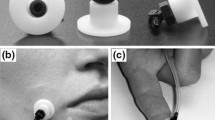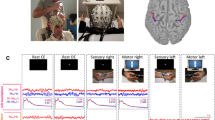Abstract
In the present study, responses of the somatosensory cortex to sensory input of ten human volunteers were investigated during a one-back task with different conditions of attention. During an condition of attention subjects were requested to detect a predefined sequence of tactile stimuli applied to two different fingers of the dominant hand while a series of visual stimuli was presented simultaneously with an asynchronous stimulus-onset to the tactile stimuli. During an condition of distraction subjects received the identical series of visual and tactile stimuli like in the condition of attention but were now requested to detect a predefined stimulus sequence within the visual stimulus domain. In both conditions, somatosensory evoked magnetic fields (SEFs) to the tactile stimuli were recorded by means of a 31-channel magnetoencephalograph (MEG) from subjects‘ contralateral primary somatosensory cortex. The mean global field power, the dipole strength, the maximum current density, and the first component of the singular value decomposition (SVD) of magnetic fields were used to compare early components of the SEF in the conditions of attention versus distraction. Surprisingly, results revealed significant decreases of measures of all four parameters during the condition of attention as compared to the condition of distraction indicating that early responses of the primary somatosensory cortex became significantly reduced in the condition of attention. We hypothesize that changes in the centre-periphery-relationship of receptive fields in the primary somatosensory cortex may account for this unexpected result.




Similar content being viewed by others
References
Anllo-Vento L, Luck SJ, Hillyard SA (1998) Spatio-temporal dynamics of attention to color: Evidence from human electrophysiology. Hum Brain Mapp 6:216–238
Braun C, Schweizer R, Elbert T, Birbaumer N, Taub E (2000) Differential activation in somatosensory cortex for different discrimination tasks. J Neurosci 20:446–450
Braun C, Heinz U, Schweizer R, Wiech K, Birbaumer N, Topka H (2001) Dynamic organization of the somatosensory cortex induced by motor activity. Brain 124:2259–2267
Braun C, Haug M, Wiech K, Birbaumer N, Elbert T, Roberts LE (2002) Functional organization of primary somatosensory cortex depends on the focus of attention. Neuroimage 17:1451–1458
Buchner H, Reinartz U, Waberski TD, Gobbele R, Noppeney U, Scherg M (1999) Sustained attention modulates the immediate effect of de-afferentation on the cortical representation of the digits: source localization of somatosensory evoked potentials in humans. Neurosci Lett 260:57–60
Buchner H, Richrath P, Grunholz J, Noppeney U, Waberski TD, Gobbele R, Willmes K, Treede RD (2000) Differential effects of pain and spatial attention on digit representation in the human primary somatosensory cortex. Neuroreport 11:1289–1293
Clark VP, Parasuraman R, Keil K, Kulansky R, Fannon S, Maisog JM, Ungerleider LG, Haxby JV (1997) Selective attention to face identity and color studied with fMRI. Hum Brain Mapp 5:293–297
Cohen RA (1993) The neurophysiology of attention. Plenum Press, New York
Cohen LG, Starr A (1987) Localization, timing and specificity of gating of somatosensory evoked potentials during active movement in man. Brain 110:451–467
Coull JT (1998) Neural correlates of attention and arousal: insights from electrophysiology, functional neuroimaging and psychopharmacology. Prog Neurobiol 55:343–361
Desmedt JE, Robertson D (1977) Differential enhancement of early and late components of the cerebral somatosensory evoked potentials during forced-paced cognitive tasks in man. J Physiol-Lond 271:761–782
Desmedt JE, Tomberg C (1989) Mapping early somatosensory evoked potentials in selective attention: critical evaluation of control conditions used for titrating by difference the cognitive P30,P40,P100 and N140. Electroencephalogr clin Neurophysiol 74:321–346
Desmedt JE, Huy NT, Bourguet M (1983) The cognitive P40, N60 and P100 components of somatosensory evoked potentials and the earliest electrical signs of sensory processing in man. Electroencephalogr Clin Neurophysiol 56:272–282
Duncan J (1995) Attention, intelligence and the frontal lobes. In: Gazzaniga MS (ed) The cognitive neurosciences. MIT Press A Bradford book, Cambridge, pp 721–734
Forss N, Hari R, Salmelin R, Ahonen A, Hämäläinen M, Kajola M, Knuutila J, Simola J (1994) Activation of the human posterior parietal cortex by median nerve stimulation. Exper Brain Res 99:309–315
Forss N, Jousmaki V, Hari R (1995) Interaction between afferent input from fingers in human somatosensory cortex. Brain Res 685:68–76
Frackowiak RSJ, Friston KJ, Frith CD, Dolan RJ, Mazziotta JC (1997) Human brain function. Academic Press, San Diego
Garcia-Larrea L, Bastuji H, Mauguiere F (1991) Mapping study of somatosensory evoked-potentials during selective spatial attention. Electroencephalogr Clin Neurophysiol 80:201–214
Hari R, Hämäläinen H, Hämäläinen M, Kekoni J, Sams M, Tiihonen J (1990) Separate finger representations at the human second somatosensory cortex. Neuroscience 37: 245–249
Hillyard SA (1985) Electrophysiology of human selective attention. Trends Neurosci 8: 400–405
Hillyard SA, Woldorff M, Mangun GR, Hansen JC (1987) Mechanisms of early selective attention in auditory and visual modalities. Electroencephalogr Clin Neurophysiol 39:317–324
Hillyard SA, Mangun GR, Woldorff MG, Luck SJ (1995) Neural systems mediating selective attention. In: Gazzaniga MS (ed) The cognitive neurosciences. MIT Press A Bradford book, Cambridge, pp 665–682
Hocherman S, Benson DA, Goldstein MH, Heffner HE, Heinz RD (1976) Evoked unit activity in auditory cortex of monkeys performing a selective attention task. Brain Res 117:51–68
Hötting K, Rösler F, Röder B (2003) Crossmodal and intermodal attention modulate event-related brain potentials to tactile and auditory stimuli. Exper Brain Res 148:26–37
Huonker R, Nowak H, Rzanny R, Rieke K (1996) Combined 3D-neuromagnetic source imaging and MRI-scans. Electroencephalogr Clin Neurophysiol 47:437–447
Johnson R, Miltner W, Braun C (1991) Auditory and somatosensory event-related potentials: I. effects of attention. J Psychophysiol 5:11–25
Josiassen RC, Shagass C, Roemer RA, Ercegovac DV, Straumanis JJ (1982) Somatosensory evoked potential changes with a selective attention task. Psychophysiology 19:146–159
Luck SJ, Girelli M (1998) Electrophysiological approaches to the study of selective attention in the human brain. In: Parasuraman R (ed) The attentive brain. MIT Press, Cambridge, pp 71–94
Macaluso E, Eimer M, Frith CD, Driver J (2003) Preparatory states in crossmodal spatial attention: spatial specificity and possible control mechanisms. Exp Brain Res 149:62–74
Mangun GR, Hopfinger JB, Kussmaul CL, Fletcher EM, Heinze HJ (1997) Covariations in ERP and PET measures of spatial selective attention in human extrastriate visual cortex. Hum Brain Mapp 5:273–279
Mauguiere F, Merlet I, Forss N, Vanni S, Jousmaki V, Adeleine P, Hari R (1997a) Activation of a distributed somatosensory cortical network in the human brain: a dipole modelling study of magnetic fields evoked by median nerve stimulation. Part I: location and activation timing of SEF sources. Electroencephalogr Clin Neurophysiol 104:281–289
Mauguiere F, Merlet I, Forss N, Vanni S, Jousmaki V, Adeleine P, Hari R (1997b) Activation of a distributed somatosensory cortical network in the human brain: a dipole modelling study of magnetic fields evoked by median nerve stimulation. Part II: effects of stimulus rate, attention and stimulus detection. Electroencephalogr Clin Neurophysiol 104:290–295
Mesulam MM (1998) From sensation to cognition. Brain 121:1013–1052
Miltner W, Larbig W, Braun C (1988) Attention and event-related potentials elicited by intracutaneous electrical stimulation of the skin. J Psychophysiol 2:269–276
Mima T, Nagamine T, Nakamura K, Shibasaki H (1998) Attention modulates both primary and second somatosensory cortical activities in humans: a magnetoencephalographic study. J Neurophysiol 80:2215–2221
Müller MM, Teder Sälejärvi W, Hillyard SA (1998) The time course of cortical facilitation during cued shifts of spatial attention. Nat Neurosci 1:631–634
Näätänen R (1975) Selective attention and evoked potentials in humans—a critical review. Biol Psychol 2:237–307
Posner MI (1995) Attention in cognitive neuroscience: an overview. In: Gazzaniga MS (ed) The cognitive neurosciences. MIT Press A Bradford book, Cambridge, pp 615–624
Posner MI, Petersen SE (1990) The attention system of the human brain. Ann Rev Neurosci 13:25–42
Posner MI, Raichle ME (1994) Images of mind. Scientific American Library, New York
Robbins TW, Everitt BJ (1995) Arousal systems and attention. In: Gazzaniga MS (ed) The cognitive neurosciences. MIT Press A Bradford book, Cambridge, London, pp 703–720
Rossini PM, Martino G, Narici L, Pasquarelli A, Peresson M, Pizzella V, Tecchio F, Torrioli G, Romani GL (1994) Short-term brain ‘plasticity’ in humans: transient finger representation changes in sensory cortex somatotopy following ischemic anesthesia. Brain Res 642:169–177
Rossini PM, Babiloni C, Babiloni F, Ambrosini A, Onorati P, Carducci F, Urbano A (1999) “Gating” of human short-latency somatosensory evoked cortical responses during execution of movement. A high resolution electroencephalography study. Brain Res 843:161–170
Rushton DN, Rothwell JC, Craggs MD (1981) Gating of somatosensory evoked potentials during different kinds of movement in man. Brain 104:465–491
Staines WR, Brooke JD, Angerilli PA, McIlroy WE (1998) Generalisability of sensory gating during passive movement of the legs. Brain Res 801:125–129
Staines WR, Brooke JD, McIlroy WE (2000) Task-relevant selective modulation of somatosensory afferent paths from the lower limb. Neuroreport 11:1713–1719
Sussman E, Ritter W, Vaughan HG (1998) Attention affects the organization of auditory input associated with the mismatch negativity system. Brain Res 789:130–138
Tapia MC, Cohen LG, Starr A (1987) Selectivity of attenuation (i.e., gating) of somatosensory potentials during voluntary movement in humans. Electroencephalogr Clin Neurophysiol 68:226–230
Torquati K, Pizzella V, Della Penna S, Franciotti R, Babiloni C, Rossini PM, Romani GL (2002) Comparison between SI and SII responses as a function of stimulus intensity. Neuroreport 13:813–819
Weiss T, Miltner WHR, Huonker R, Friedel R, Schmidt I, Taub E (2000) Rapid functional plasticity of the somatosensory cortex after finger amputation. Exp Brain Res 134:199–203
Woldorff MG, Gallen CC, Hampson SA, Hillyard SA, Pantev C, Sobel D, Bloom FE (1993) Modulation of early sensory processing in human auditory-cortex during auditory selective attention. Proc Natl Acad Sci U S A 90:8722–8726
Woldorff MG, Fox PT, Matzke M, Lancaster JL, Veeraswamy S, Zamarripa F, Seabolt M, Glass T, Gao JH, Martin CC, Jerabek P (1997) Retinotopic organization of early visual spatial attention effects as revealed by PET and ERPs. Hum Brain Mapp 5:280–286
Woldorff MG, Hillyard SA, Gallen CC, Hampson SR, Bloom FE (1998) Magnetoencephalographic recordings demonstrate attentional modulation of mismatch-related neural activity in human auditory cortex. Psychophysiology 35:283–292
Wörgötter F, Suder K, Zhao YQ, Kerscher N, Eysel UT, Funke K (1998) State-dependent receptive-field restructuring in the visual cortex. Nature 396:165–168
Yeshurun Y, Carrasco M (1998) Attention improves or impairs visual performance by enhancing spatial resolution. Nature 396:72–75
Acknowledgements
This research was supported by grants from IZKF Jena.
Author information
Authors and Affiliations
Corresponding author
Rights and permissions
About this article
Cite this article
Huonker, R., Weiss, T. & Miltner, W.H.R. Reduction of somatosensory evoked fields in the primary somatosensory cortex in a one-back task. Exp Brain Res 168, 98–105 (2006). https://doi.org/10.1007/s00221-005-0072-4
Received:
Accepted:
Published:
Issue Date:
DOI: https://doi.org/10.1007/s00221-005-0072-4




